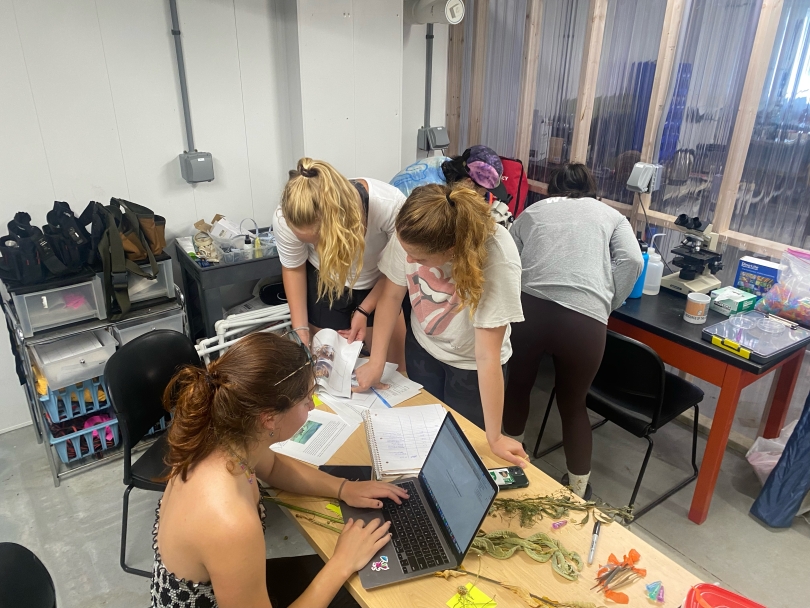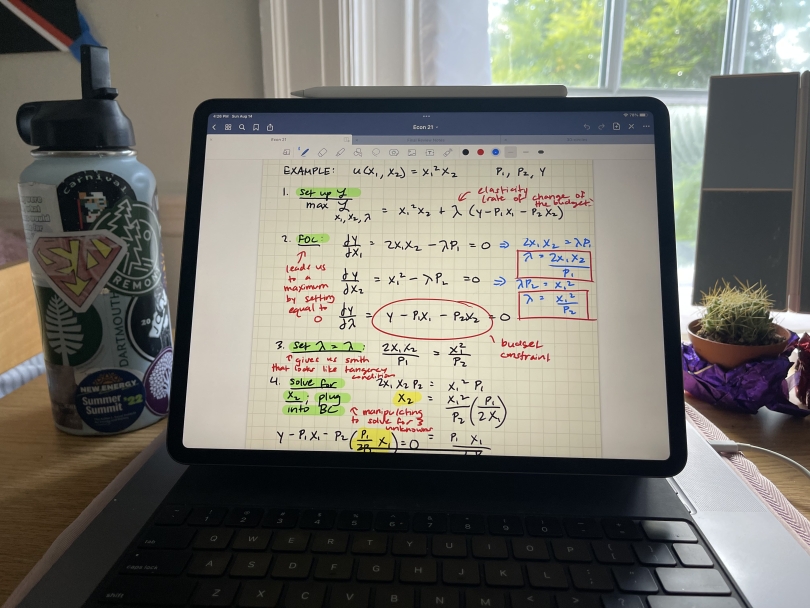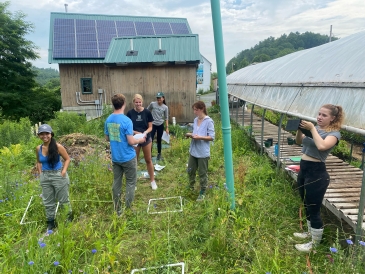
My 22X Courses: Sophomore Summer
This summer, I'm taking a two-course term with one core class for each of my majors: Economics and Environmental Studies. My busiest days are Wednesdays through Fridays, but I only have one class on Monday and none on Tuesday, leaving ample time for my research with the Energy Justice Clinic, leading the Dartmouth Energy Alliance, my part-time job with Admissions, and bonding with fellow '24s!
ENVS 25: Agroecology

If you don't mind getting your hands dirty and are intrigued by the idea of improving food systems, Professor Ong's ENVS 25: Agroecology is the perfect Sophomore Summer class for you. My favorite part of Agroecology is investigating field problems from start to finish with a team because it feels like partaking in real, hands-on scientific research. Dartmouth's Organic Farm is our classroom—we board a yellow school bus each Thursday morning to get to our lab session. My group has studied the effects of riparian buffers on water retention times, survivorship of annual versus perennial flower species, and the impacts of the age of agroforestry plots on predator biodiversity. After collecting data in our weekly lab, we prepare group presentations and papers where we switch from taking on the roles of lead author, data analyst, and researcher.
As a non-CS major, coding in R has been a completely new yet exciting experience because I've learned how to visualize data in bar graphs, box plots, histograms, and more. Our three TAs have been very accessible and essential in helping myself, a beginner programmer, gain an understanding of R. With no tests or quizzes, our grade is entirely based on collaborative group work where we can turn in drafts and our individual final project, which is extremely open-ended. This approach has been such a welcome change of pace where I feel focused on just learning and not worried about exams. For my independent final field project, I am analyzing how intercropping tomato and basil impacts farmers' economic profits. During our last lab session, we exchanged ideas in a working discussion between the Organic Farm managers and ENVS 25 students on how future class sections can aid in developing better irrigation and pest management systems. I love the practicality of this class and its application to real-world issues, like changing weather patterns on crop yields and species diversity.
ECON 21: Microeconomics

Of Dartmouth's three Economics core courses (ECON 20: Econometrics, ECON 21: Microeconomics, and ECON 22: Macroeconomics), Microeconomics has the reputation of being the most math-heavy. This course builds upon ECON 1, which I took during my freshman fall, so initially I was a bit nervous about how much I would remember from AP Calculus and ECON 1. As for class structure, two midterms and one final comprise 74% of our final grade; the rest are discussion board participation, problem sets, and module worksheets for completion. We finish weekly online modules at our own pace, where video explanations are posted that we can pause or rewatch as many times as we'd like. I have especially enjoyed the game theory and consumer choice units because I've found the material very relevant to my own life.
Although the content can be challenging, Dr. Petre is an amazing professor and explainer! Between Friday's collaborative problem set sessions, her weekly office hours, and our TA's weekly office hours, there are plentiful opportunities to ask questions on concepts less intuitive to us. Dr. Petre has made me feel much more confident in understanding the math and logic behind why certain models work that we were introduced to in ECON 1. In fact, my friend Annie and I are using Dartmouth's Take Your Professor Out to Lunch program with her this upcoming Week 9 to get to know her outside the classroom at one of Hanover's nicest restaurants.
Farewell for now, blog! I will be studying abroad at University College London (UCL) this fall for an exchange program with Dartmouth's Economics department, then interning in New York City this winter as a legal assistant during my off-term. I look forward to updating you when I return about all my junior year experiences—see you soon!

















